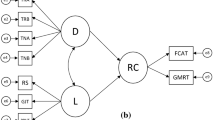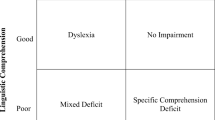Abstract
A simple view of reading was outlined that consisted of two components, decoding and linguistic comprehension, both held to be necessary for skilled reading. Three predictions drawn from the simple view were assessed in a longitudinal sample of English-Spanish bilingual children in first through fourth grade. The results supported each prediction: (a) The linear combination of decoding and listening comprehension made substantial contributions toward explaining variation in reading comprehension, but the estimates were significantly improved by inclusion of the product of the two components; (b) the correlations between decoding and listening comprehension tended to become negative as samples were successively restricted to less skilled readers; and (c) the pattern of linear relationships between listening and reading comprehension for increasing levels of decoding skill revealed constant intercept values of zero and positive slope values increasing in magnitude. These results support the view that skill in reading can be simply characterized as the product of skill in decoding and linguistic comprehension. The paper concludes with a discussion of the implications of the simple view for the practice of reading instruction, the definition of reading disability, and the notion of literacy.
Similar content being viewed by others
References
Anderson, R., Hiebert, E., Scott, J. and Wilkinson, I. 1985. Becoming a nation of readers: The report of the Commission on Reading. Urbana, IL: University of Illinois, Center for the Study of Reading.
Applebee, A., Langer, J., and Mullis, I. 1987. Learning to be literate in America. Princeton, NJ: National Assessment of Educational Progress, Educational Testing Service.
Barr, R. 1984. Beginning reading instruction: From debate to reformation. In P. Pearson (ed.), Handbook of reading research (pp. 545–581). New York: Longman.
Bond, G. and Dykstra, R. 1967. The cooperative research program in first-grade reading instruction. Reading Research Quarterly 2, 5–142.
Brown, D. 1954. Auding as the primary language ability. Unpublished doctoral dissertation, Stanford University.
Calfee, R. and Associates. 1978. Stanford foundation skills test. Unpublished manuscript, Stanford University, Stanford, CA.
Calfee, R. and Associates. 1980. Stanford foundation skills test (rev. ed.) Unpublished manuscript, Stanford University, Stanford, CA.
Calfee, R. and Calfee, K. 1979. Interactive reading assessment system. Unpublished manuscript, Stanford University, Stanford, CA.
Calfee, R. and Calfee, K. 1981. Interactive reading assessment system (rev. ed.). Unpublished manuscript, Stanford University, Stanford, CA.
Calfee, R. and Drum, P. 1986. Research on teaching reading. In M. Wittrock (ed.), Handbook of research on teaching (3rd ed., pp. 804–849). New York: Macmillan.
Chall, J. 1967. Learning to read: The great debate. New York: McGraw-Hill.
Curtis, M. 1980. Development of components of reading skill. Journal of Educational Psychology, 72, 656–669.
Danks, J. 1980. Comprehension in listening and reading: Same or different? In F. Murray (ed.), Reading and understanding (pp. 1–39). Newark, DE: International Reading Association.
Doehring, D., Trites, R., Patel, P., and Fiedorowicz, C. 1981. Reading disabilities: The interaction of reading, language, and neuropsychological deficits. New York: Academic Press.
Flesch, R. 1981. Why Johnny still can't read. New York: Harper & Row.
Freedman, S. and Calfee, R. 1984. Understanding and comprehending. Written Communication, 1, 459–490.
Fries, C. 1963. Linguistics and reading. New York: Holt, Rinehart & Winston.
Gates, A. 1949. Character and purposes of the yearbook. In N. Henry (ed.), The forty-eighth yearbook of the National Society for the Study of Education: Part II. Reading in the elementary school (pp. 1–9). Chicago: University of Chicago Press.
Glushko, R. 1979. The organization and activation of orthographic knowledge in reading aloud. Journal of Experimental Psychology: Human Perception and Performance, 5, 674–691.
Gough, P. 1983. Context, form, and interaction. In K. Rayner (ed.), Eye movements in reading: Perceptual and language processes (pp. 203–211). New York: Academic Press.
Gough, P. 1984. Word recognition. In P. Pearson (ed.), Handbook of reading research (pp. 225–253). New York: Longman.
Gough, P. and Hillinger, M. 1980. Learning to read: an unnatural act. Bulletin of the Orton Society, 30, 1–17.
Gough, P. and Tunmer, W. 1986. Decoding, reading, and reading disability. Remedial and Special Education, 7, 6–10.
Guthrie, J., Martuza, V., and Seifert, M. 1979. Impacts of instructional time in reading. In L. Resnick and P. Weaver (eds.), Theory and practice of early reading (Vol. 3, pp. 153–178). Hillsdale, NJ: Erlbaum.
Harman, D. 1987. Illiteracy: A national dilemma. New York: Cambridge Book Company.
Healy, J. 1982. The enigma of hyperlexia. Reading Research Quarterly, 17, 319–338.
Henderson, L. 1982. Orthography and word recognition in reading. London: Academic Press.
Hoover, W., Calfee, R., and Mace-Matluck, B. 1984a. Teaching reading to bilingual children study: Vol. 5. Reading growth (Final Report, Contract No. 400-83-0007). Washington, DC: National Institute of Education.
Hoover, W., Calfee, R., and Mace-Matluck, B. 1984b. Teaching reading to bilingual children study: Vol. 6. Instruction (Final Report, Contract No. 400-83-0007). Washington, DC: National Institute of Education.
Huey, E. 1968. The psychology and pedagogy of reading. Cambridge: MIT Press. (Original work published 1908).
Jackson, M. and McClelland, J. 1979. Processing determinants of reading speed. Journal of Experimental Psychology: General, 108, 151–181.
Johnson, D. and Baumann, J. 1984. Word identification. In P. Pearson (ed.), Handbook of reading research (pp. 583–608). New York: Longman.
Jorm, A. and Share, D. 1983. Phonological recoding and reading acquisition. Applied Psycholinguistics, 4, 103–147.
Olson, D. 1977. From utterance to text: The bias of language in speech and writing. Harvard Educational Review, 47, 257–281.
Palmer, J., MacLeod, C., Hunt, E. and Davidson, J. 1985. Information processing correlates of reading. Journal of Memory and Language, 24, 59–88.
Pearson, P., Hansen, J., and Gordon, C. 1979. The effect of background knowledge on young children's comprehension of explicit and implicit information. Journal of Reading Behavior, 11, 201–209.
Perfetti, C. and Curtis, M. 1986. Reading. In R. Dillon and R. Sternberg (eds.), Cognition and instruction (pp. 13–57). Orlando: Academic Press.
Rubin, A. 1980. A theoretical taxonomy of the differences between oral and written language. In R. Spiro, B. Bruce, and W. Brewer (eds.), Theoretical issues in reading comprehension (pp. 411–438). Hillsdale, NJ: Erlbaum.
Rumelhart, D. 1977. Toward an interactive model of reading. In S. Dornic (ed.), Attention and performance VI (pp. 573–603). Hillsdale, NJ: Erlbaum.
Seymour, P. and Porpodas, C. 1980. Lexical and non-lexical processing of spelling in dyslexia. In U. Frith (ed.), Cognitive processes in spelling (pp. 443–473). London: Academic Press.
Singer, M. and Crouse, J. 1981. The relationship of context-use skills to reading: A case for an alternative experimental logic. Child Development, 52, 1326–1329.
Snowling, M. 1980. The development of grapheme-phoneme correspondence in normal and dyslexic readers. Journal of Experimental Child Psychology, 29, 294–305.
Stanovich, K. 1980. Toward an interactive-compensatory model of individual differences in the development of reading fluency. Reading Research Quarterly, 16, 32–71.
Stanovich, K. 1986. Matthew effects in reading: Some consequences of individual differences in the acquisition of literacy. Reading Research Quarterly, 21, 360–407.
Stanovich, K., Cunningham, A., and Feeman, D. 1984. Intelligence, cognitive skills, and early reading progress. Reading Research Quarterly, 19, 278–303.
Stanovich, K., Nathan, R., and Vala-Rossi, M. 1986. Developmental changes in the cognitive correlates of reading ability and the developmental lag hypothesis. Reading Research Quarterly, 21, 267–283.
Stanovich, K. and West, R. 1983. On priming by a sentence context. Journal of Experimental Psychology: General, 112, 1–36.
Sticht, T. and James, J. 1984. Listening and reading. In P. Pearson (ed.), Handbook of reading research (pp. 293–317). New York: Longman.
Vellutino, F. 1979. Dyslexia: Theory and research. Cambridge, MA: MIT Press.
Venezky, R., Kaestle, C., and Sum, A. 1987. The subtle danger: Reflections on the literacy abilities of America's young adults. Priceton, NJ: Educational Testing Service.
Williams, J. 1985. The case for explicit decoding instruction. In J. Osborn, P. Wilson, and R. Anderson (eds.), Reading education: Foundations for a literate America (pp. 205–213). Lexington, MA: Lexington Books.
Author information
Authors and Affiliations
Rights and permissions
About this article
Cite this article
Hoover, W.A., Gough, P.B. The simple view of reading. Read Writ 2, 127–160 (1990). https://doi.org/10.1007/BF00401799
Issue Date:
DOI: https://doi.org/10.1007/BF00401799




